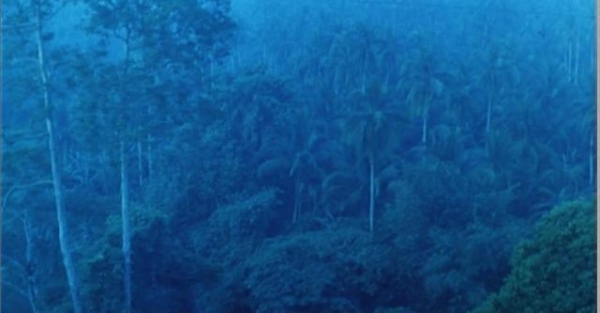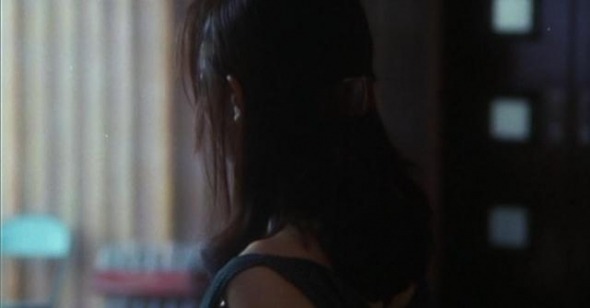Harbor Lights
Nathan Kosub on Days of Being Wild
Wong Kar-wai moved from Shanghai to Hong Kong in 1963. In Hong Kong, he says, “even the sunlight seemed more abundant.” It seems strange, at first, that Days of Being Wild is mostly rain and blue days, and stranger still that the movie’s great moment of artifice is Victoria Harbour at sunset. The lead’s surrogate mother (Rebecca Pan) stands silhouetted by an evening sky. In her house we always hear the sounds of the sea, but they are the sounds of a harbor anywhere: foghorns, seagulls, surf. The sky looks like a backdrop—the only shot in the movie when Wong’s big budget looks cheap.
That sunset is the Wong Kar-wai his critics see: a pastiche without substance. But think how differently any other director would film Hong Kong. Bustle for sure, crowds and docks, and at least one long take of the island from hilltops to harbor. Wong’s is a separate fiction, never occupied by more than one or two people. When two, they are almost always a woman and a man. Even in nightclubs, the camera hides in dressing rooms.
For all Wong’s nostalgia, time and place are subverted by character. The realm of Wong’s abundant sunlight is in fact an intimate affair; only outside his memories does the world expand at all, into forests in the Philippines that tower like magic kingdoms. What do we say of the director who boasts of the city of his youth but makes it a city of interiors only—of close spaces, vanities, and window ledges? That he is unexpected in ways his critics do not believe him to be?
In response to a preview of My Blueberry Nights at Cannes last month, Dave Kehr called Wong Kar-wai “featherweight, obvious, and overrated.” Kehr added that Wong is an inspiration to “generations of TV commercial directors,” but how many generations have passed since Chungking Express hit North American shores? Wong directs television commercials, of course, which play like the parodies Kehr seems to suppose all Wong Kar-wai movies to be. But Kehr is wrong.
The first few minutes of Days of Being Wild (credits for executive producers, cold opening, title card) are my favorite few minutes in a movie made in my lifetime. A man named Yuddy (or York, depending on the translation, played by Leslie Cheung) buys a bottle of Coca-Cola, guesses the name of the woman, played by Maggie Cheung, who sells it to him, and tells her she’ll see him in her dreams. She looks over her shoulder as he leaves, disbelieving but hooked, and the camera cuts to a long, easy pan along telephone wires over a tropical forest in the Philippines.
It seems like the wrong start for a movie better characterized by the “tropical torpor” that, as Stephen Teo writes in his book Wong Kar-wai, “quite literally saturates the whole film.” Thus the ensuing blue tint in a jungle of coconut and palm, and a song on the soundtrack—the humid “Always in My Heart” by Los Indios Tabajaras—like a little electric fan. Patrick Tam, a mentor to Wong Kar-wai since Wong’s days as a scriptwriter, takes particular pride in the opening scene. Tam cut the bulk of the movie from the endless shots of countless angles that Wong filmed again and again. Teo quotes Tam: “Yuddy is a ruthless kind of man, very dynamic, full of energy. When chasing after girls, he would be direct, straightforward. Therefore right from the opening, that’s what you see—no playing around.”
The opening scene is edited quickly, to the assured click of Yuddy’s heels on concrete. It isn’t that the ensuing transition from Maggie Cheung’s backward glance to the title is unexpected, or particularly unique. It is, however, the essential cut for understanding the themes of Wong’s career: namely, memory and dreams. In Days of Being Wild, memory functions as regret; dreams are made up of memories, but transmute those memories forward - preserve, in effect, the good from lives of ultimate unhappiness and dissatisfaction by putting love somewhere out of reach.
That point, I think, is well understood: that memory haunts and time ticks on. But the precision with which Days of Being Wild conveys its ghosts deserves more attention. The film’s most memorable line is from Yuddy, who sits bleeding from a gunshot wound in a train at the end of the movie. We see his face and removed expression, and the camera cuts once again to the same tracking shot of the coconut and palm tree forest. “Always in My Heart” plays, just like the beginning, and Yuddy says, in voiceover, “I said I’d never be able to tell which woman I loved the most until the end. I wonder what she’s doing now.” He pauses, then sighs. “It’s dawn,” he says. “Looks like quite a beautiful day. I wonder what sunset will be like.” The scene ends.
One could argue that this second edit is more accomplished, if only by omission; the expected cut back to So Lai-chen (Maggie Cheung) at the start of the film doesn’t occur. But it’s the transition from dreams to memory at the beginning of the movie that makes the woman Yuddy thinks about obvious to us so far in. Why is it So Lai-chen, and not Mimi (Carina Lau), on his mind? Mimi, after all, is the ubiquitous presence: she meets Yuddy’s auntie, rebuffs Yuddy’s pal (Jacky Cheung). But Mimi is not the woman we think of in Yuddy’s dreams. We remember So Lai-chen.
Take her call to a street payphone where she and a cop (Andy Lau) walk when her affair with Yuddy goes bad. The cop is in love with So Lai-Chen, but she can’t let Yuddy go. Instead she and Andy Lau walk together; on the last night he sees her, he says to call if she’s ever feeling bad. There’s a payphone on his beat, near the streetcar tracks that So Lai-chen dreamed of as a kid in Macao. She leaves but never calls, and soon after, the cop leaves Hong Kong to become a sailor.
In the end, of course, So Lai-chen does call, but it’s difficult to say how long it has been: weeks, months? The could-be lovers might be years apart by then, so the payphone isn’t the cloying narrative device of a missed connection. More than a sad shot, the scene reinforces the decisions that the characters make on their own. The characters, not the camerawork—not the rain—shoulder the blame.
If Wong Kar-wai just directed car commercials, minute-long spots stretched to an endless syrup pace, sadness would be a mood only: a softly lit room from a long-forgotten year. Is it humorlessness, then, that his critics see? If so, Wong’s best defense is written right there in the script for Days of Being Wild. On a train in the Philippines at the end of the film, Yuddy asks the sailor if he’s heard of the bird that never lands. The legless bird, always flying, is a fable in more than one Wong film.
“You ever hear of a bird—” Yuddy begins.
“Yes,” the sailor interrupts. “The one with no legs.” He sneers. “Maybe you can fool girls with that story. Think you’re some kind of bird? Which part of you?”
Critics forget that line, I think. They forget that the director isn’t fooled by romance, or cloudy from nostalgia. Wong is self-aware and self-critical. His edits are fundamental instead of obvious, which is to say he’s someone who understands movies.
Yuddy and So Lai-chen’s first scene together is a dream; it’s difficult to imagine a nicer one. The tracking shot just after is a memory that recurs as the film progresses; it both replaces the dream and contains it. The cut is how you get from one to the other, the easy exclamation at the end of why Wong matters—why, in fact, his movies make movies a joy.

